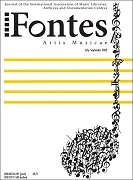Fontes Special Issue: In Celebration of RISM’s Seventieth Anniversary
Thursday, November 10, 2022

The latest issue of the journal Fontes artis musicae is a special issue entitled In Celebration of RISM’s Seventieth Anniversary. Guest editor Nicole Schwindt (Chair, RISM Working Group, Germany) describes the ground that RISM has covered in the seven decades since the project’s founding, writing in the issue’s preface that “the founders might have been surprised but satisfied at how literally the approach of compiling an international inventory of musical sources has been realised in the long run.” Alongside the progress is the understanding that a lot of work remains to be done. The four articles in the special issue treat “the new opportunities that have recently opened up for RISM, but also about lacunae that are now beginning to be addressed.”
The special issue of Fontes is accessible through Project Muse (subscription required) or the IAML website for IAML members.
Contents:
-
Editor’s Preface by Nicole Schwindt
-
“Fifty Years with the Fondo Cappella Sistina of the Biblioteca Apostolica Vaticana” by Richard Sherr, based on his talk at the First RISM Lecture
Abstract: Reflections on the study of the music sources in the fondo Cappella Sistina of the Biblioteca Apostolica Vaticana (RISM Catalog | RISM Online) beginning with Giuseppe Baini and Franz Xaver Haberl in the nineteenth century and progressing chronologically through the twentieth-century studies of Knud Jeppesen, Joshua Rifkin, the author, and others, to the incorporation of the sixteenth-century manuscript sources into the RISM catalogue in the twenty-first century. In an Addendum, evidence is offered that suggests that the main scribe of the Medici Codex (1518) can be identified as Giovanni Maria Borsetto who was the official scribe of the Papal Chapel for a short time in 1522. -
“Maurizio Cazzati’s ‘Unsold Music’” by Rodolfo Zitellini
Abstract: Terms like ‘business’, ‘marketing’, and ‘self-promotion’ are seldom used to describe musicians, let alone composers from the sixteenth and seventeenth centuries. The Italian composer Maurizio Cazzati (1616–1678; RISM Catalog | RISM Online) understood very well the importance of the printed book as a means of self-affirmation. During his long career, he undertook great efforts to publish and disseminate his works. This life-long commitment produced a remarkable corpus of music, relatively unique for this period as the almost all of it was printed. The study of Cazzati’s work as both composer and printer shows the care and carefulness in how he planned his corpus, as is his effort in producing high-quality printed editions and the artistic control exerted over them. We will be drawing upon an underexamined inventory of his print shop that was created after his death. This will enable us to identify some prints thought to be lost and explore in detail the complex fate of some others, reinforcing the idea that the music printing business in the seventeenth century was a complex and still not completely understood phenomenon. -
“Die Notenautographe (1825–1884) im Album von Ferdinand Hiller: Überblick, Einordnung, Quellenwert” by Henrike Rost
Abstract: Music-related friendship albums of the nineteenth century, from the environment of the artistic elites, are characterised by their signed entries, which were usually provided with the date and place. As far as their value as a source for questions of musical philology is concerned, these musical manuscripts are of interest to those searching for unknown compositions and versions. The album of the pianist, composer, and Cologne music director Ferdinand Hiller (1811–1885) is a bundle with over 350 entries (RISM Catalog | RISM Online). In addition to verses, mottos, letters, and drawings, it includes a total of 146 autographs of music from the period between 1825 and 1884, dating back to composers such as Johannes Brahms, Frédéric Chopin, Franz Liszt, Gioachino Rossini, Robert Schumann, and many others. On the one hand, they are quotations from piano and instrumental works, from operas and symphonies, furthermore canons, on the other hand complete compositions, especially piano pieces, and songs. The aim of this article is to provide the first clear overview of these ‚musical’ album leaves, most of which address the album owner personally, and to classify them. -
“‘Pure or Tainted?’ Representing a Source of Colonial Bengali-English Music in RISM” by Emerson Morgan, Christina Linklater, and Pramantha Tagore
Abstract: In 2019, the U.S. RISM Office created a catalogue record for a notated manuscript of the opera Satī ki kalaṅkinī (‘Pure or Tainted?’) by Nāgendranath Bandyopādhyāẏ and Modan Mohan Barmaṇa (RISM ID no. 1001079017; RISM Catalog | RISM Online). Written in Calcutta in 1876 and presently housed at Harvard Library, the opera offers passages in Bengali and English script accompanied by music notation in a parallel format. The office chose to pursue Satī ki kalaṅkinī as a test case for exploring opportunities to draw non-European music into a project such as RISM but faced ambivalence about speaking on behalf of its ‘Indian’ pasts. This study engages particularly with the ethics of transcription and visibility, while also drawing attention to the text’s cultural setting. Recently, questions of representation have taken on exceptional significance in U.S. academic libraries, owing to a managerial turn toward diversity, equity, inclusion, and antiracism. We share this case as a contribution to a more robust and realistic understanding of global music cultures, including those from colonial encounters.
Abstracts published here with kind permission.
Share Tweet EmailCategory: New publications

